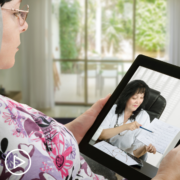Tag Archive for: multiple myeloma clinical trials
How Will Telemedicine Impact Multiple Myeloma Clinical Trials?
How Will Telemedicine Impact Multiple Myeloma Clinical Trials? from Patient Empowerment Network on Vimeo.
What impact has telemedicine had on multiple myeloma clinical trials, and what effect will it have on trials in the future? Expert Dr. Joseph Mikhael explains the impact of telemedicine early on in the COVID-19 pandemic, how he uses virtual visits with his patients currently, and the role and benefits of telehealth in the future of myeloma care.
See More From the Myeloma TelemEDucation Empowerment Resource Center
Related Resources:
Transcript:
Dr. Joseph Mikhael:
COVID-19 has impacted our lives in just about every way imaginable, and in multiple myeloma, sadly has very much impacted our ability to conduct clinical trials. Thankfully, now that we are out of the immediate acute phase when many trials were suspended, we actually have been able to work around this in general, where now we’ve been able to re-introduce studies and bring in new studies, of course, and we can do so in a more careful manner. Many of our clinical trials now are allowing intermittently to have telemedicine visits, which reduces the traffic for patients and makes it a little bit smoother. Some of the questionnaires and the things that we used to have to fill out on paper or physically in-person now can be done electronically, and so I think in many respects, we’ve really overcome most of the barriers so that we can continue the outstanding work and clinical trials to provide options for our patients that were not available before.
And looking to the future, I hope, even paradoxically in some way that this may — now that we’ve developed a more sophisticated telemedicine platform — it may allow us to do more and perhaps reach patients that may not have been reached before, there are already studies and trials that are being done through telemedicine, not necessarily a drug trial but quality of life studies, engagement studies, educational studies, different ways that we can enhance a patient’s experience and investigate better ways of doing things now that we can do so more fully electronically.
So, when I think of telemedicine and the future in multiple myeloma, I think it will continue to have a role in the long term. I think, much like people think that there will be more virtual meetings, I think we all want to get back to in-person meetings of various types and sizes and shapes, there will always be a component of virtual, and I can think even in my own practice and some patients that have quite a long drive to come down to see me, that they will still have to have face-to-face visits, but intermittently when the things are going well, follow-up like visits where the discussion may be limited.
I think there will be a role for this so that we can leverage the best of telemedicine and the best of in-person medicine so that the patients can receive the best care possible.
How Will the Pandemic Impact Multiple Myeloma Trials?
How Will the Pandemic Impact Multiple Myeloma Trials? from Patient Empowerment Network on Vimeo.
How has the COVID-19 pandemic changed multiple myeloma clinical trials, and how can telemedicine play a role in trials? Dr. Sarah Holstein shares her perspective on how trials were altered and her suggestions for improvements in trials.
See More From the Myeloma TelemEDucation Empowerment Resource Center
Related Resources:

Will Telemedicine Be a Long-Term Survival Tool for Myeloma Patients? |

|

Are There Limitations of Telemedicine for Multiple Myeloma Patients? |
Transcript:
Dr. Sarah Holstein
Early on, I was very concerned about the ability to conduct clinical trials during the pandemic, early on, at least in our institution, and I know that there were many others across the country, there was a lot of concern about really limiting what was considered by the IRB (Institutional Review Board) to be an essential contact. They perhaps placed an emphasis on later phase clinical trials and thought that the earlier phase clinical trials weren’t necessarily proving to be a benefit for patients and therefore shouldn’t be opened, and I would have to say that that was not what my thought was. I really think that all clinical trials, whether it’s a Phase I, Phase II, or Phase III or of utmost importance to our patients and are important for their care. So again, early on, I was very concerned about limiting the access of clinical trials to patients. As the pandemic has continued and it’s become clear that this is going to be life as we know it for unfortunately, quite some time, I know at our institution, we’ve really tried to be as safe as possible, but all clinical trials are open and we’re allowed to enroll, I think there still is room for improvement with respect to how telemedicine is incorporated into clinical trials, and whether or not we can do things like allowing patients to get their study labs drawn closer to home as opposed to traveling to the academic center, so I think there continues to be room for improvement for really trying to minimize the amount of traveling that people do, and therefore the amount of potential exposure that patients have.
We still are not routinely using telemedicine for the clinical trial visits, that most of those are still in person. And I think depending on the specific trial, that is probably appropriate if you have a new agent and a lot of what you’re looking for is evidence of toxicity, I think it is important to be able to evaluate the patients in person and really be able to conduct a normal physical exam, having said that though, if a patient’s on a clinical trial where they’re receiving more standard of care, and perhaps it’s in a maintenance phase of a study, I think being able to utilize telehealth for some of those more routine visits would really be beneficial for both the patients and the healthcare team.






